A Most Merry and Illustrated
History of

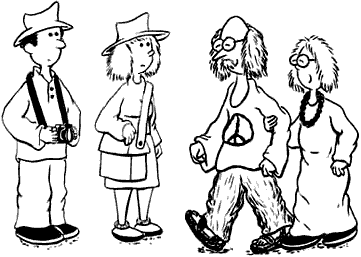
Where Haight Street runs into Ashbury
Return to Haight Street
For anyone taking a trip to the West coast, a visit to San Francisco is always worth the while. Not only can you visit the really interesting places like Fisherman's Wharf and Alcatraz Island, but after paying the mandatory visit to the Golden Gate Bridge with its attached park and tourist center, you might take a stroll toward the University of San Francisco. If you head southeast past the Panhandle and diagonal toward Buena Vista Park, you should pass close to the point where Haight Street runs into Ashbury.
At first glance, what you see isn't a lot different than what you'll find in other "nicer" areas of a typical US city. There's shops, bistros, and restaurants. For the most part, these are populated with a fairly typical smattering of big-city inhabitants. But a careful observer may notice a slightly higher percentage of senior citizens decked out in somewhat outdated and at times even corny costumes: long-hair (what there is of it), wire rimmed glasses, sandals, bead necklaces, and odd-looking pendants and medallions. Further out, the numbers of these older graying citizens gradually thin down, but you'll still find them sprinkled throughout the state, and for that matter, throughout the country.
What you've found - if you haven't been fooled by imitations and lookalikes - is the remnants of the uniquely mid-twentieth century and largely American phenomenon known as the hippies. Weeding out the imitations, though, might not be that easy. And truth to tell, it might not even be possible. Oh, there are definitions in books and on various "Are You A Hippie?" web sites. But the trouble is that many of today's self-proclaimed definers of hippiedom now craft their wording to suit their own modern-day political purposes. From what you read, you might think all hippies shared the mores of modern fringe movements like the Bomb-The-Automobile Environmentalists or All-You-Need-Is-Tofu Animal Rights Activists. Neither of which really fits the original hippies. After all, a lot of the hippies liked a good burger and loved nothing better than to drive around in creaking and decrepit, polluting and gas guzzling, multi-colored and flower-blazoned buses and vans.
If you try to broaden the definition, you still fare no better. Inevitably you end up with something like a hippie is someone who believes everyone should be allowed to live life as they please as long as they don't hurt anyone. Of course, that definition could also apply to anyone who really doesn't give two hoots about anything. There are megabillionaire Wall Street entrepreneurs, stock and bond investors, three card Monte swindlers, number runners, bums, and Fifth Avenue fanny peddlers who all fit that description. But they aren't hippies.
The First Hippies
First of all, let's keep in mind the words of Humpty Dumpty. When we use a word it will mean just what we choose it to mean, neither more and nor less. So when you get down to it, you can define a hippie any way you want.
Now if you're a stickler for history, you can argue that the actual hippie
The hippies were an outgrowth of what is now called the Beat Generation, or to use the more popular term, the beatniks. Originally a literary movement, the Beats started out as a handful of students at Columbia University in New York City in the 1940's.
The most famous of the Beats is probably Jack Kerouac, whose "On the Road" became the how-to manual for all adolescents who wanted to find themselves. But it was really the poet Allen Ginsberg who deserves the credit for transforming the writings of the Beat Generation from fodder for obscenity trials to their now dubious honor of being required reading for high school students. Other Beat writers were Ken Kesey, Gregory Corso, and the very strange William Burroughs.
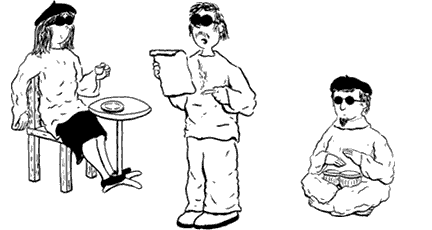
Before

After
In addition to wanting to craft a new type of literature, the Beats also spent a lot of time doing things of which their parents did not approve. They drank, partied, and indulged in both cross and same gender pleasures. And they took drugs.
The drugs were a major part of the Beat lifestyle, and it was they who first touted drugs as a means (to use a now rather trite expression) of expanding one's consciousness. Parts of the most famous Beat writings, such as "On the Road" and "Howl", were penned heavily under the influence. Which some people think explains a lot.
For a number of reasons - lack of gainful employment, arrests, confinement to mental hospitals, and such things - the founding members of the Beat Generation gradually drifted away from New York and reassembled in San Francisco. In an effort to promote the Beat writings (and also to make a living), the poet Lawrence Ferlinghetti opened the City Lights Bookstore. City Lights wasn't just a bookstore. It was also a publishing company, and many of the early Beats had their work published by City Lights.
Hanging around the beatniks became the cool thing to do, and City Lights was increasingly frequented by the kids from the area around the University of San Francisco. As usual, the "older" group ridiculed any younger people who wanted to be like them - almost as much as they ridiculed anyone who DIDN'T want to be like them. Soon some of the older and less perceptive Beats, who were themselves often hangers on of the original New York group, began derisively labeling these kids - who so obviously wanted to be "hip" - as "hippies." The name stuck.
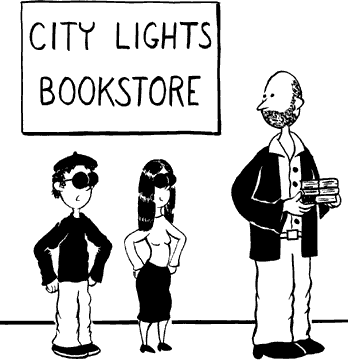
The first hippies
The Transition
Oddly enough, it was a generational gap between the older and younger beatniks that furthered the demise of the Beat Movement and resulted in the emergence of the sixties hippies. For one thing, many of the younger crowd didn't really go for the Beat music of choice; that is, the "cool" and "bop" jazz, best characterized by the music of Charlie Parker, Dizzy Gillespie, and Miles Davis. When jazz first emerged in the early 1900's, it was considered an absolutely evil manifestation of the most heinous moral perversions. But by the late 1950's and early 60's a lot of parents liked jazz. It was even being touted by scholars and musicologists as the only true American music. So if you wanted to torment your parents you had to turn to rock and roll. And at that time, that meant Elvis.
The Beats never went in for Elvis. To them he was funny, unsophisticated, and something of a hick. Since rock at that time was exclusively - and this means exclusively - limited to the boy-meets-girl themes, he was strictly for the kids. Fine for prepubescents, but NOT what a supercool beatnik went in for.

The Beats never really went in for Elvis.
But as Paul Revere would have said, the British were coming.
According to one story, the American showman and impresario Ed Sullivan had gone to London in 1963 scouting out talent. While there he had seen a mass of screaming, hysterical kids outside of a concert hall. When he asked what was up, he was told everyone was waiting to see a group called the Beatles.
Ed knew a "really big shew" when he saw it and contacted the Beatle's manager, Brian Epstein. Soon Ed had the group booked on his Sunday night television show. Certainly no one could have foreseen the consequences of what Ed hath wrought since at the time his show was considered more wholesome than a Wednesday night Bible study.
Aside from their music - which continues to stand the test of time - the Fab Four's most distinctive characteristic was their hair. Abandoning the slicked-back ducktail of the James Dean "rebellious" adolescent, by the time they reached America, they were sporting a drier and shaggier cut that had the distinctive bangs that somehow parents just hated. So when the Beatles appeared on Ed's show in February 1964, all hell broke loose.

Ed knew a "really big shew" when he saw it.
Parents everywhere freaked out as they saw their daughters transformed from the skinny, virginal bobby soxers who lounged around their bedroom floors blubbering over J. Frank Wilson's "Last Kiss" into the slavering, screaming, hormone filled mobs that now swarmed to the football stadiums and convention centers. Everything British became the rage. Hair went down and skirts when up. Beards, and mustaches sprouted everywhere and rock bands abandoned the clean-cut mien of Buddy Holly as they tried to outdo each other for the long and shaggy look. With parents hating the hair and music so much, the kids gleefully took up both as the new symbols of rebellion.
The Generation Gap
Of course, for so many kids to partake in a revolution with such elan took more than four singers with sugarbowl haircuts. The truth is there had been a generation gap growing for about twenty years and no one had noticed.
The generation gap of the 1960's is often pooh-poohed as being nothing more than the normal friction between teenagers and their parents. But the 60's gap really was wider than anything before (or since). Ultimately, like so much of later twentieth century culture, the gap originated with World War II and eventually became a topic of serious study for scholars as prestigious as Margaret Mead. But you don't really need a Ph. D. from Columbia to understand why the gulf between the two generations was so wide.
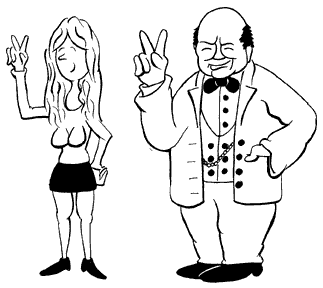
The generation gap ultimately had its origins in WWII
The young men and women of America who marched off to war in 1941 had grown up during the Great Depression. Strange to say, this gave them more respect for working - to use the popular phrase - "within the system". Although there was a slight increase in radicalism during the Depression's earliest and grimmest years, Franklin Roosevelt's New Deal pretty much put a squelch on that. And as America began to gear up for World War II, prosperity returned quite literally with a bang. So when the war was finally over and the young veterans returned home, they saw themselves, the government, and the US Military - and "working within the system" - as having saved the world.
With such a positive self-image, the WWII crowd set about boomingly producing little carbon copies of themselves. Unfortunately, the copies were pretty rough. Reasoning that it was their parents who had crafted the world where entire cities could be wiped out in a millisecond, the kids remained remarkably unconvinced that they had been sired by the greatest generation that ever lived. Other fallout from the war (no pun intended) was that schools began to hammer on about how fortunate we were to live in a democracy where everyone - and that meant everyone - shared the same rights and privileges
Another problem was that the kids born in the late 1940's and early 50's were also the first generation to be bombarded with the near instantaneous man-on-the-street news coverage. From watching the nightly broadcasts, they soon had plenty of reasons to doubt that the Greatest Democracy in the World was even close to delivering on its promises. One area where it clearly wasn't delivering was also the one area it was supposed to. That was Civil Rights.
Civil Rights
The Civil Rights movement was a truly venerable institution that had been around since before the Civil War. But by "working within the system" it had achieved virtually nothing. By 1950, restaurants, schools, parks, and even restrooms could still legally be separated by race, and as the 1960's rolled in, segregation was still universal in the South. The progress had been so poor that the greatest of the early civil rights leaders, W. E. B Dubois, had simply given up and left America.
But most of the leaders stuck around and newer (and more effective) tactics were adopted like the demonstration, the sit-ins, and the Freedom Rides. Although the Freedom Riders were themselves non-violent, the television coverage sometimes made it look like they were causing riots because wherever they showed up the Gallant Paragons of Southern Law Enforcement would move in and pound everyone's head in. The situation was no joke either; black citizens just ATTEMPTING to register to vote were quite literally taking their lives into their hands.

Gallant Paragons of Southern Law Enforcement
Although the animosity generated by the Civil Rights issue was largely divided along geographical lines, there was a generational element there as well. Older Americans tended to take a conservative stand and still thought it best to change things (once again) "through the system". A lot of their kids, though, saw the demonstrations not only as necessary for the Civil Rights Movement, but also as something downright useful for other things as well. Soon the new tactics were being adopted by the more politically minded students on the college campuses. By 1964, the American universities were becoming places that the more straightlaced Americans saw as breeding dangerous and distinctly anti-American ideas.
The Beat Baton Passes
Exactly when beatniks morphed over into the hippies can be pinpointed fairly accurately. In 1966 the popular "Man from Uncle" TV show broadcast an episode called "The Pop Art Affair". In what was certainly one of the least credible of the shows, Napoleon and Illya were trying to capture an evil Thrush villain who got rid of his enemies by exposing them to a gas that caused (and this is not made up) fatal hiccups. Of course like any good Thrush villain, he had to have a cover, and so he doubled as a Greenwich village art dealer who sold pop-art created by - the word used in the script - the local "beatniks".
Now although there were some beat elements written into the script (espresso, jazz, poetry readings), from their dress and the references to folk music, the generation gap, and "happenings", most of the young people that Napoleon and Illya met were clearly hippies - or at least a crude parody of such as expected from a mainstream television show. But the word hippie was never used.
And even as late as February 1967, when Hunter S. Thompson appeared on To Tell the Truth, the corner at Haight and Ashbury was called the "beatnik" section of the San Francisco. So even at that late date, to most Americans, the crazy young people of the counter-culture were still beatniks.
But the next month - March 1967 - Life magazine ran a column by Loudon Wainwright how the time of the hippies was at hand. Beatniks were gone, and it was clear that the two groups were not the same.
The beats were never considered much of a threat unless you were a super-paranoid nut like J. Edgar Hoover. There were never a lot of beats for one thing, and they were never much in evidence outside certain areas of New York and San Francisco. Above all, during their heyday they were apolitical, non-activist, and largely invisible to mainstream America. But with the hippies it was different. Soon they were just about everywhere, and it was clear that they wanted to make a difference.
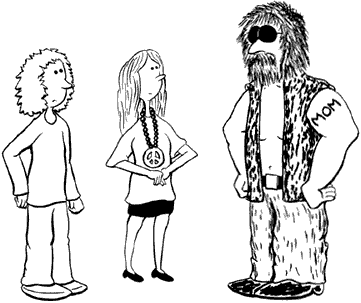
It wasn't just mainstream America that didn't like the hippies.
Let There Be Hippies
So by 1967 you had long hair, radical politics, and rock and roll. Suddenly there were hippies. America freaked out.
It wasn't long before a lot of Americans became convinced the hippies were just aching to tear down the basic fabric of America. It wasn't just mainstream America that didn't like the hippies, either. Once a group of the Hell's Angels motorcycle gang swooped down on a group of hippies for no other reason than they wanted to. All in all, the hippie-haters pretty much included anyone who thought that believing and preaching peace, love, and toleration of others was stupid. In America that was (and is) a pretty large slice of the population.
Even if their kids weren't hippies (yet), parents looked for even the slightest hint of sympathy for these enemies of the God and America. They saw the signs, of course, even if they weren't there, and a lot of parents and teachers ended up getting just a bit paranoid. Soon kids found they could get kicked from home and school for such horrible crimes as having long hair (the boys) or having a kneecap peek out from the hem of a skirt (the girls).
Although some parents took things pretty much in stride, an awful lot of them didn't. Since proper styles of hair and clothes are among the things that have no rational basis, parents and teachers could give no real reason for their hysteria. So not only did they start looking just plain silly to their kids, but also a bit nuts. One young man had lived abroad for five years and returned to visit his parents. When he reached his house, his father wouldn't even allow him inside until he went out and got a haircut. Relations between parents and offspring began to get testy, and some kids were told to cut their hair or move out. Some cut, but others moved, and one place they went was San Francisco.
Flower Children, Freaks, and Heads
It took about a year for the fledgling "hippie" beatniks to be transformed into the now famous long-haired hippies of San Francisco. So a strict (though narrow) definition of a hippie would be a member of the young counterculture community who began living in the Haight-Ashbury neighborhoods starting around 1965. According to one author who has studied the era, there were not all that many. He estimated that there were perhaps 800 true hippies at the height of it all. This number seems awful low, though. Crowds at San Francisco rock concerts soon began to number in the thousands.

Three General Categories: Flower Children, Freaks, and Heads
Despite all the talk about "living on the streets", actually doing so was a drag. A lot of hippies found more or less permanent domiciles. Although some did live in the share-and-share-alike communes, most lived in a pad (as it was called then) with one or two others. They got by with a mixture of help from friends, the free social services (some official, some less so), and even the occasional job. If they came from the Bay Area, some might even scrounge an occasional handout or meal from their parents.
But the good times on Haight Street faded in just a few years. If the hippies had disappeared then, the original strict definition given above would suffice. But instead of dying out, the hippies began to fan back East. By 1968, they ranged from California to Maine, and just about every town and hamlet had a few.
To the untrained eye the hippies looked a lot alike. When a writer went to San Francisco around 1966, she saw them to be middle class, largely white, and entirely heterosexual. But the hippies were less homogenous in lifestyle and ideology than it first appeared. In a few years they could be divided (with fair accuracy) into three species: flower children, freaks, and heads.
"Flower children" can be considered to be the more idealistic and optimistic hippies who believed all the stuff about love and peace. If you were a hippie before and during the 1967 San Francisco "Summer of Love", you could be accurately dubbed a flower child. And it really was possible to live on love as long as you stuck around the Bay area. If you knew where to look, you could get free food and clothes, and if you didn't live in one place, you could usually scrounge some place to sleep for a few weeks at a time.
Flower children are what most people think of attending the events that were called Happenings, Be-Ins, Love-Ins, and all the Other-Types-of -Ins. These were mostly gatherings of the young people in the various Bay Area parks. The official representatives of the local, state, and federal governments went into fits but really couldn't do much about them.
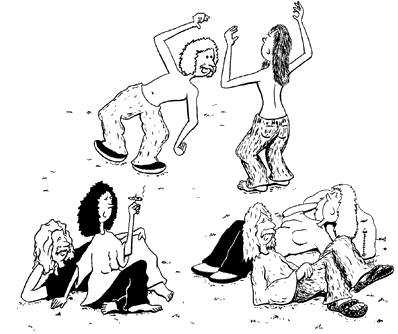
Be-Ins, Love-Ins, and All-Sorts-of-Ins
The flower children had two codes that were particularly disturbing to Official America. One was the doctrine of free love. This horrified the parents who were certain it meant their kids were making out-of-wedlock whoopee, which it did. Of course, that stuff had been going on ever since the institution of marriage had been invented, and many a parent in Victorian America would explain to their children that the first child was often early. But true free love, in the sense of picking who you pleased when you pleased and wherever you pleased, was practiced less than it was preached. Even among the hippies the natural biological pairing mechanism tended to take over.
But by today's standards the most controversial of the hippie habits - and one which is sometimes glossed over by those extolling the hippie virtues - was their use of drugs. If you read about hippies today (particularly if it it's written in a positive light), you might think they spent most of their time picking flowers, demonstrating for peace, and eating granola. But even a cursory examination of contemporary articles (or an honest conversation with a former hippie) makes it clear that what is now called drug abuse was a major part of their lifestyle.

Passing the pipe with John Deutschendorf
It's often forgotten what an easy-going and lassie-faire attitude the hippies had toward drugs. This influenced the stands of the US political parties and at first the idea that "mind expanding drugs" - particularly marijuana - would soon be legalized was popular enough that the more daring politicians would seriously speak in favor of "liberalization" of drug laws. As late as the 1980's, it was still cool to be a "liberal" on drugs, and motion pictures would sometimes show suburban parents taking a few tokes once they had packed the kids off to bed. Even John Deutschendorf (aka John Denver), who later became so squeaky clean that he hosted Muppet Television Specials and had his songs officially praised in mainland China, sang in one of his early songs how fine it was to have his friends and his old lady "pass the pipe around".
By the mid-1980's, though, this attitude had faded, and for the three decades the federal and state governments adopted increasingly zero-tolerance drug policies that were largely a backlash against the hippies. Enforcement, though, tended to be selective. Although the younger, poorer, and minority kids would still be arrested and sentenced to hefty terms, the executives sitting in their offices and snorting cocaine over lunch rarely had worries. But even they had to cut out their pleasure once the Supreme Court ruled that random mandatory drug testing was perfectly within the bounds of the U. S. Constitution.
This doesn't mean that the drugs were harmless. Although the scenes in "Reefer Madness" that show immediate addiction arising from a puff or two have correctly been relegated to the realm of low comedy, it's also true that to the more insecure hippies the drug aspect could be the end-all and be-all of their existence. If you had no life, no friends, and no future, then it was easy to fall prey to the solace of drugs. Then it was a short trip from being an all-you-need-is-love flower child to an all-I-want-is-dope dopehead. Or just a plain "head".
The term "head" was sometimes used to refer to any hippie. But the term really should apply only to the hard-core user. An early chronicler of Haight-Ashbury life was once told by an informant that he hadn't taken anything that day. Well, he told her when pressed, only a couple of "ups" (speed or amphetamines) and some "grass" (marijuana). In his own mind, that didn't count. Although the author seemed to think her friend was taken from the midcut of the hippie population, the use of speed (avoided by many hippies) suggests he was indeed a bonafide head.
The days of the flower children of San Francisco were relatively short-lived as Haight-Ashbury degenerated into a haven of runaways, junkies, and bums. By the fall of 1967 the owner of one of the psychedelic shops had said that business had fallen off to the point where he was going to close. One English girl who moved to the Bay Area hoping to find the happy, smiling flower children of legend, instead encountered burned out kids with glazed eyes and vacuous expressions. Crime rates had skyrocketed, and by the time the sixties faded, Haight-Ashbury was nothing more than a typical big city skid row. But by then the hippies had spread out across the country and the term "freak" had come into widespread use.

Good Times on Haight Street
"Freak" was actually a generic all-encompassing - and fairly early - term. Originally it was a simple pejorative used by the more belligerent of the mainstream society against the hippies. So in that sense, being a freak - like being a hippie - was more something you were called, not something that you were. But like many terms of abuse, it was proudly adopted by the members of the group itself.
Soon "freak" became the term preferred by the hippies. But it was a little more complicated than that. Although all flower children and heads were freaks, you couldn't really label all freaks as flower children or heads. After all, if you were a graduate student at Berkeley, you could easily be a freak, but it's a stretch if you were a flower child. Certainly if you were putting in the requisite number of hours of study and came up with a degree, you probably weren't a head.
But flower child, freak, or head, all the hippies were supposed to hold things like money in contempt. Certainly multi-millionaires like the Rolling Stones and the Beatles could easily get by with a disdain for materialism, but the average hippie still had to eat. And if they held true to beliefs of eschewing the ways of the establishment (and so refusing government handouts), they did have a bit of a dilemma. For the hippies living in San Francisco, though, there was a very workable solution. They could go to the Diggers.
The Diggers
Ask anyone on the street if they know about the hippies and they'll say, sure, and will probably give an answer that isn't too far from the truth. But ask anyone about the Diggers and you'll get a blank look. But without the Diggers the hippies probably would have fizzled out even quicker than they did. After all, it was the Diggers that provided free food, free clothes, and free whatever else to the Haight-Ashbury community. Who knows? If all the hippies had been like the Diggers, it just might have worked.
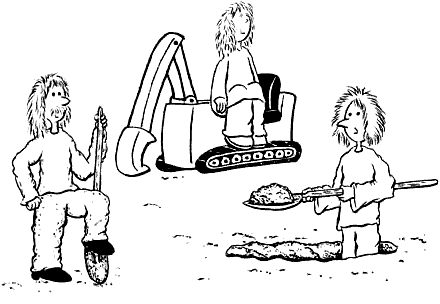
The Diggers: If all the hippies had been like them, it just might have worked.
The Diggers of San Francisco originally started out as a street theater group who kept getting busted by the police since their performances had a tendency to rub the city authorities the wrong way. First the performances (by the standards of the day) were usually "obscene". Also the performers were usually acting without a permit. So any gatherings (even puppet shows) were usually broken up by the police.
To counteract the official intransigence, a group of the street performers formed the Artists Liberation Front along with a lot of other artists, poets, writers, musicians, and anyone else who was interested. In addition to denouncing the way the state and city manipulated the arts, the ALF offered free concerts and free festivals. So progressing onto free everything else was a natural move.
At one point some members of the Artists Liberation Front issued a manifesto and signed themselves "The Diggers". The name was borrowed from a group of 17th century English farmers who had decided to start farms on public lands and distribute the food to the poor. So in San Francisco a free store (supplied by donations) was opened where anyone could come in and take what they needed whether food, clothes, or other everyday living needs. Naturally this didn't sit well with the local merchants, particularly those who catered to the Bay Area's poorer residents. But eventually a kind of uneasy truce settled, and the city let the Diggers do their thing if there wasn't too much trouble.
After a while the Diggers began to attract some national interest. News reporters kept asking who was in charge and finally someone said it was a fellow named Emmett Grogan. The trouble is it's hard to tell - even now - if Emmett existed. Even though there are photos of Emmett and he was the author of a book and articles, he was hard to find for interviews. Some people said he was just a name for several of the more important Diggers, and another story was Emmett really did exist but just kept in the background.
Soon there were more than one group of hippies providing free food and services in San Francisco. You could quite literally live on love (or less) and one author wrote how he survived almost exclusively on the free stew you could get in Berkeley Park. The different Digger groups seem to have been operating independently of each other, but they were all called "The Diggers". That never bothered anybody. A Digger was a Digger.
Their ultimate demise was due to a lack of organization and loss of clientele. One church agreed to let the Diggers operate out of their building. But with no leader to set a schedule and no one to make sure the office was kept in reasonable order, the arrangement fell apart. And as the hippies moved from San Francisco, the Diggers also faded and moved on.
The Music
One thing that brought hippies together was music. It was during the hippie era that rock concerts became the megaevents that they are to this day. But there were big differences. For one thing, rock in the 1960's and 70's focused exclusively on the music; choreography was non-existent. In this day of emaciated females gyrating across gargantuan stadium stages and lip-synching their songs into headmikes, it's easy to forget that Jerry Garcia and his friends could attract huge crowds just by standing on stage and playing.

Jerry Garcia and his friends could attract huge crowds just by standing on stage and playing.
But not all hippies liked hard rock, and if you didn't, there was always the folk music. The start of the Folk Music Revival can be pinpointed to at a benefit concert for migrant workers on March 3, 1940. This had been organized largely through the efforts of folklorist Alan Lomax. Among the performers were a 27 year old Woody Guthrie and a 20 year old Pete Seeger.
The Folk Scene started off as an East Coast phenomenon centered around New York City. Aspiring folk musicians gravitated to Greenwich Village, home of the beatniks, and in the early 50's you might even find Woody Guthrie himself playing and singing with the young musicians hanging around Washington Square.
But despite a number of "acceptable" folk groups like the Kingston Trio, the Limelighters, and the New Christy Minstrels, the politics of the folk movement was definitely to the left. Woody had always boasted he was a Communist, and Pete Seeger's sympathetic biographer states that as a young man Pete had briefly been a party member. So to the staid Americans folk music was even more insidious than rock and roll. It became a perfect vehicle to irritate authority if you didn't go for the electric sound.
Actually rock and folk were by no means inseparable and bands would often mix the styles. One of the most popular songs of the 60's was the Byrds' rendition of Pete Seeger's musical adaptation of Ecclesiastes, and an electric version of "The House of the Rising Sun" - an old bawdy house/gambling folk song - became a pop hit when recorded by Eric Burdon and The Animals.
Everything all came together in 1969 in New York State at what has to be the most legendary concert of all time, Woodstock. Woodstock, of course, wasn't at Woodstock but was held on the farm of Max Yasgur outside of Bethel. Although it has become an incredible status symbol to have been there, at the time some remembered that both the organization and entertainment left a little to desired. True, some of the performances were justly legendary (Richie Havens as the opening act for one). But others were definitely below par. At one point John Sebastian forgot the words of his song and had to ask the audience for help, and a member of the Grateful Dead said they had never played so bad.
There were also mix-ups in schedules. Jefferson Airplane performed at 7:30 in the morning and the cars, buses, and vans so paralyzed the area that the musicians had to be flown in by helicopter. There may have been three days of peace, love, and music, but there was also no food, cold rain, and no way to leave.
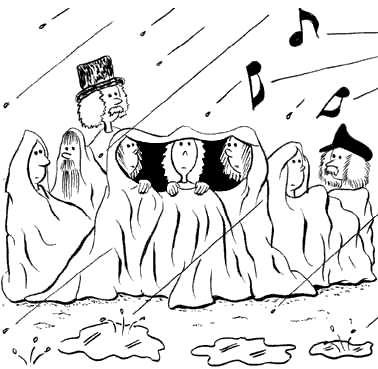
Woodstock: Three days of music, peace, love, no food, cold rain, and no way to leave.
The Drugs
Like it or not, you can't talk about the hippies without talking about the drugs. Virtually all the hippies used drugs, a fact a lot of former hippies try to hide from their kids.
Some hippies saw the drugs as purely recreational. With some drugs you could get a buzz and not have a hangover. Others claimed they were actually beneficial, which was also a great way to get a rise out of the older folks. If you wanted to send your parents into fits of apoplexy, all you had to do was say drugs would expand your consciousness, enhance creativity, and impart greater mental powers than what you could ever do on your own. A lot of hippies said stuff like that and some even believed it.
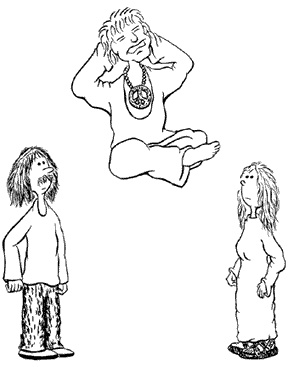
Timothy Leary Tunes Out and Drops In
That drugs of any kind can "expand the consciousness" has never been proven in any clinical sense, and the statement's probably meaningless in any case. But a man who was a true believer was Timothy Leary. Tim was the originator of the slogan "Tune in, Turn On, and Drop Out." To many hippies he was a combination mystic and scientist who ended up being persecuted by a vindictive government. But to a lot of older Americans, he was one of the most evil men in America, whose advocacy of drugs ruined the lives of thousands of kids. To most psychologists, he was a man who brought their field in for ridicule and abuse.
Tim had a rather strange career. After high school, he was appointed to the United States Military Academy at West Point, but soon had to resign as part of a deal when he was caught drinking. He then pursued a normal college education in psychology, eventually earning a Ph. D. from Berkeley.
A man of undoubted ability and intelligence, Tim became the Director of Psychology Research at the Kaiser Foundation Hospital. With immense funding, he began using psychotherapy to help the emotionally disturbed. He was rather discouraged by his success or rather, the lack thereof. In almost everything he tried, one third of his patients got better, a third got worse, and a third stayed the same. You got the same results if you just let the patients alone. Soon Tim was wondering if he had spent eight years of higher education studying a field that was horse hockey.
Tim personal life was also bumpy. When he began his psychotherapeutic studies in Berkeley, he and his wife, Marienne, began drinking heavily and partying. Soon Tim was showing a lighter side with the ladies, which is never good for a marriage. He and Marienne argued a lot, and one morning Tim woke up to find she had gone to the garage and turned on the car engine and killed herself. His daughter was with him at the time and was so traumatized that she didn't speak for months. After Marienne's death, Tim left Berkeley with his daughter and son. A quick second marriage ended after a few months, and soon he was traveling around the world doing nothing and living off a small research grant.
In his ramblings he attended a cocktail party in Italy. There he met the head of the Department of Psychological Relations at Harvard. Tim talked about how he thought the patient and therapist needed to be more personally involved and that it was the traditional psychologist/patient separation that hindered effective psychotherapeutic treatment. Both patient and psychologist had to participate. This sounded great to the man from Harvard, and almost on the spur of the moment he offered Tim a job.
At the same time, psychology and psychiatry had been undergoing somewhat of a revolution, mainly for the reason that Tim had noticed. If patients were treated only by psychotherapy, you might as well have left them alone. So practitioners had been experimenting with new techniques that were based more in physiology than in psychology: electroconvulsive shock therapy (still used), lobotomies (totally discredited), and drugs (a major part of modern treatment).
Tim's interest was in the drugs. Soon he had (so he said) remarkable results. When he gave psilocybin to a group of prisoners, the drug, so Tim said, prevented them from returing to a life of crime. Of course, Tim not only gave the prisoners the drug, but once they got out, he also gave them money, helped them find jobs, and if necessary, a place to stay. That, said Tim's critics, is what really kept the men out of jail. The drugs had nothing to do with it.
Criticism never fazed Tim, though. It was the drugs, as far as he was concerned. Then he learned about lysergic acid diethylamide - LSD - for short, which was much more powerful. Since a little bit of psilocybin was good, in his opinion, then a whole lot of LSD must be better.
LSD - the infamous "acid" of the hippies - had, in fact, been around for a long time. It was invented in 1938 by the Swiss chemist, Albert Hoffman. But it wasn't until 1943 that Dr. Hoffman was working in his lab when his mind starting acting strange. He thought he might be going nuts and went home. The hallucinations, perceptions of irreality, and just crazy thoughts lasted for a few hours, and the next day he realized he must have accidentally gotten a snort of something.
Dr. Hoffman soon discovered he had ingested about 50 micrograms of LSD. The terms "psychomimetic" or "psychedelic" were coined to refer to such drugs that induced symptoms of psychosis. Somewhat paradoxically, they were soon being tested as treatments for the mentally ill.
Tim loved the drugs. Not only did he believe the psilocybin helped rehabilitate his prisoners, but LSD, he said, helped a group of theology students have mystical experiences. He never adequately defined "mystical experience", and soon some of his colleagues began to think that Tim's enthusiasm was outstripping his scientific judgment.

Observing Tim's methodology
Although Tim's followers have oft times trashed the Harvard establishment for what they say was a closeminded attitude toward's Tim's research, it's hard to deny that Tim's "sessions" seem to have quickly degenerated into all-night parties at his home in Newton Center. Since everyone - and that included the principal investigator - ended up getting tanked and stoned, it's not easy to see how Tim was able to make and record his scientific observations. That would have been particularly tricky since he had no qualms about letting his young and more comely female subjects pay him enthusiastic and amorous attention. Maybe he left the lights on.
His custodianship of the samples was also somewhat shoddy, and he would leave the drugs just lying around the house. Once Tim's 12-year old son saw some psilocybin pills laying around, and after sampling some himself, fed them to the family dog.
Strictly speaking, Tim's methodology was not illegal. Neither psilocybin nor LSD were banned at the time and the drugs were in fact provided to him gratis by the manufacturers knowing they were to be used in research (but probably not THAT kind of research). But Tim's techniques certainly did violate every guideline of good clinical practice, and one of the more objective observers at one of Tim's "sessions" (a Standford psychiatrist who was friendly with Tim) felt compelled to say Tim work was in no way scientific. Worse, the attention Tim paid to his female subjects was - as he himself acknowledged - completely against the ethics of clinical research, then or now.
Tim had, in fact, lost all objectivity regarding the drugs. As far as he was concerned they were the greatest thing God had created, and everyone should take them. He had no brief for anyone who thought they might be harmful. Tim and his buddies claimed no one ever flipped out, and when such cases could be documented, Tim had a ready answer. The "subjects", he said, just hadn't taken the drug in the "right frame of mind."
With Tim's colleagues getting more and more irritated, Tim had no trouble recruiting graduate students. Soon almost all of them were all signing up with him. This left the other professors high and dry, and his rapport with his fellow faculty continued to take a nosedive.
Despite all the goings on and his ticked-off colleagues, Tim likely could have remained at Harvard if he would have been willing to try a little bit of legitimate science. The administration was willing to let him continue if his protocols were more carefully reviewed and if the drugs were adminstered under the guidance of a qualified physician. Tim said no way. He was the one to decide how he did his job, and in any case, it was too late. Newspaper articles began to appear about the drug parties going on in the Harvard Department of Psychology. Apparently some of Tim's subjects were also passing the goodies around to their friends. Tim soon got the boot from Harvard.
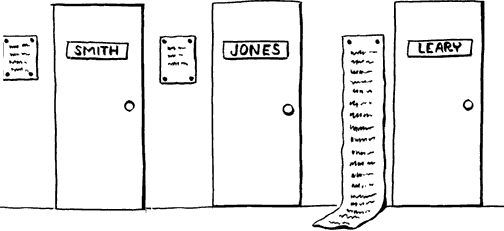
Graduate sign-up at Harvard
After that Tim, for all practical purposes, spent the rest of his life screwing around. For a while he had his "therapy sessions" in Mexico until the Mexican police paid a visit and were greeted by a rather wild eyed and incohrerent young woman wearing nothing but body paint. Tim and his friends were then bundled onto a plane and deported back to the US. Back home, Tim then embraced the hippie culture and advocated peace, love, and as always, drugs. But when LSD was banned by federal law in 1966, Tim found himself increasingly investigated, subpoenaed, and arrested.
For a while the government's attempt to nail him came to naught. Tim was leading a charmed life and even though he got busted occasionally, he never spent more than a few days in jail. But in 1965, his first really serious arrest came in Laredo, Texas. Although that netted him a nominal 30 year sentence, he was released on bail and the conviction was later tossed out. But as the drug hysteria in America grew, it was only a matter of time.
On December 26, 1969, Tim, his third wife,son, and daughter were driving outside of Laguna, California when he was pulled over by a cop. A search of the car inevitably produced samples of hashish, marijuana, and LSD. Tim's wife and daughter got suspended sentences, and his son was nailed for three months. But Tim was sent up the river for 20 years. This time he went.
It looked like the government had finally won. Tim was sent to San Quentin where he met among others Charles Manson. But in 1971, after he was transferred to a minimum security prison, he escaped by climbing up a cable and dropping over the fence. He traveled to Africa, then to Switzerland, and he was finally nabbed a year or so later in Afghanistan. So it looked like Tim would have to spend the rest of his life in jail after all.
Soon the disquieting rumor began to circulate that Tim had was finking out. Some of his friends didn't believe it. Not Tim. Not Anti-Establishment Tim.
But Tim's appearance before a grand jury was followed immediately by an indictment of a drug dealer. And when he was granted a parole from California in 1974, it was, according to the government announcement, because of his "cooperation". If nothing else, all this produced a lot of angst in the fading hippie underground.
Just how much Tim really blew has always been argued. But however much he did or didn't, in 1976 he was paroled from Federal custody. Tim was out of jail for good.
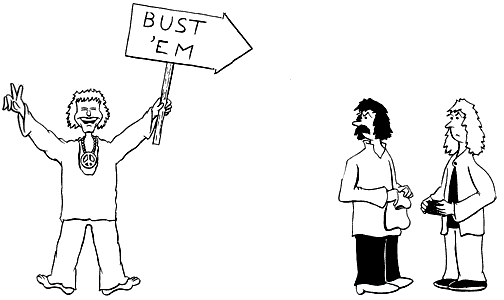
Did Tim fink on his friends?
Although Tim did have bonafide credentials as a clinical psychologist, there was no hospital, institution, or university that would touch him with the proverbial ten foot pole. When he first got out of prison he landed a job as a disc jockey. That lasted as long as it took the station owner to find out who he was.
Like many of the aging hippie leaders, Tim made some money by going on the lecture circuit. On one tour he even debated with Watergate conspirator and fellow convict, G. Gordon Liddy, who as a prosecutor in New York, had tried to send Tim to jail. But you can't pull money like that in forever, particularly with an emerging university crowed that for a large part doesn't even know who you are. Tim also wrote an autobiography that did so poorly that he had to return part of his advance.
Tim's ideas began drift a bit off center, even for him. He was sure that by 1990 we would have a pill that would extend life for 400 years. He also came up with the not very original solution that the colonization of space was the answer for the population problem. That may have fine for science fiction buffs who thought warp drive was possible and who forgot that humans have to breathe air. But Tim's ideas really couldn't be considered much of an answer if you really want a working solution within the next thousand or so years.
As the 1980's rolled in, Tim turned to various and not terribly successful business ventures which even included selling software. As the 90's approached, like most everyone else, he discovered the Internet. Soon he came to believe it was the ultimate realization of mankind's consciousness, and he began touting the Internet rather than drugs. If nothing else, at least this kept him out of jail.
Though Tim probably didn't realized it, he had finally dropped out. He did make a lot of friends around the Hollywood crowd, though, many of whom remembered him from the 60's and thought that hanging around Timothy Leary was pretty cool. Fewer and fewer people even remembered who he was, and to those who did, he was just some hippie/drug guru of a by-gone era. His followers, though, remained intensely loyal and were convinced the government was still out to get him. And they may have been right. Finally it all came to an end when Tim died in 1996.
Vietnam and the Draft
But being a hippie wasn't all rock concerts, tuning in, turning on, and dropping out, of course. There was, after all, a war on.
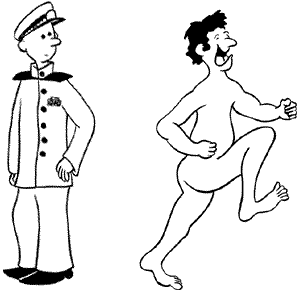
Jack Kerouac at Boot Camp
Possibly because they were of World War II vintage (although few were actually veterans), the Beats haven't come off as being particularly anti-militaristic. That doesn't mean they were suited to be good soldiers. Certainly if they inadvertently landed in the military it didn't seem too hard for them to get out. Jack Kerouac, for instance, got discharged from the Navy by running naked across the parade ground while shouting "Geronimo". And because of certain indulgences of the Beats, 4-F exemptions were fairly easy to get. But by the 1960's, one thing that the Army wanted was unlimited manpower and a little background as to why is in order.
After World War II, the allied superpowers - Britain, France, and the United States - still claimed a lot of "colonies". The sun still did not set on the British Empire, and the Americans had the Philippines, Hawaii, Puerto Rico, and far out of the way places like Guam and Samoa. The French, too, had a worldwide empire which extended from French Guiana (where they still are) to the coastal areas south of China, then called French Indochina.
The trouble started in September 1945 just as WWII ended. Then an Indochinese guerilla leader who had fought against the Japanese, Ho Chi Minh, listened to all the stuff we were saying about democracy and declared a new independent country. He called it Vietnam.
Ho tried to negotiate an end to the French occupation, but the French responded by shelling Haiphong harbor. About 6000 civilians were killed. That wasn't very nice, but the French were our friends, and so we felt honor bound not to like Ho. Besides, Ho also had leftish leanings that didn't set too well with the more conservative Americans whose biggest hero at the time was the rabid anti-communist, Senator Joe McCarthy.
Sad to say, the French didn't handle the Vietnamese "insurrection" very well, and to put it mildly, they got their tails whipped. Fighting kept on and finally after getting trounced at Dein Bein Phu in 1954, the French just up and pulled out. A treaty was signed in Geneva where Vietnam was divided into two countries - the North and the South. The US, Russia, and China all signed with the understanding elections were to be held in 1956. But when it was found that Ho Chi Minh was going to win, the United States put an end to that nonsense in a hurry.
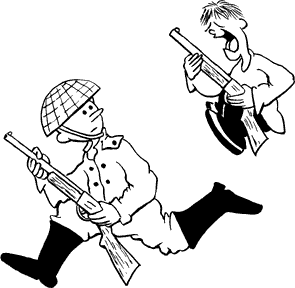
At Dein Bein Phu.
In 1955 a Vietnamese military leader friendly to the US, Ngo Dinh Diem, officially declared the Republic of South Vietnam. Not entirely by coincidence, Ngo was named its first president. And even with less of a coincidence, then-President Eisenhower officially declared we would help South Vietnam remain independent.
Ho Chi Minh decided to fight - literally - for Vietnam's reunification. The Russians and Chinese decided to help Ho, and the United States wanted to heave Ho. Finally in the same year, the South East Asia Treat Orgainization was formed, and with it an official treaty committing America to help fight communist aggression in the Pacific region. Soon America was sending military "advisors" to Vietnam. By 1960, there were about 900, and by 1964 it was up to 16,000.
In 1964 a United States naval vessel in the Vietnamese Gulf of Tonkin reported it had been fired upon. Although within a week a grumpy, gripey Lyondon Baines Johnson was ragging on his Secretary of Defense, Robert McNamara, that he doubted the incident really happened, nevertheless he asked for (and got) a Congressional resolution allowing him to do whatever he wanted. In a year there were nearly a hundred thousand advisors in Vietnam. Only they weren't called advisors anymore. They were troops.
It has been debated ad nauseam whether American involvement in Vietnam was prompted by a sincere desire to help promote democracy and freedom in a poor and developing country or if it was just a way to shore up a succession of tin-plated two-bit dictators hand- picked by the United States. It really doesn't matter much anymore, but what did matter was the young men of America soon found themselves as prime targets for the draft. Or as it was termed then, the "Selective Service".
Eventually the selectivity got less, and the service got more. On December 1, 1969, the selectivity was scrapped altogether, and the selecting was done by lottery. If you were born on September 14, you won. If your birthday was June 8, you lost. Of course, in this case if you won, you lost, and if you lost, you won.
But selective or not, win or lose, the hippies agreed on one thing about the draft. They were agin it.
For over a hundred years, America had used the draft solely as a temporary measure to raise manpower for clearly defined wars. Prior to World War II, compulsory miltiary service was even considered the mark of a totalitarian regime, not a democracy. But now the draft was being used to feed an already bloated industrial-military complex (where $500 toilet seats soon became the norm), and by the mid-1960's, the Pentagon had unlimited manpower to do whatever it darn well pleased. As the war escalated "Stop The Draft" demonstrations sprang up everywhere and the hippies (the men, at least) made a great show of burning their draft cards. Which, by the way, did not constitute exemption.
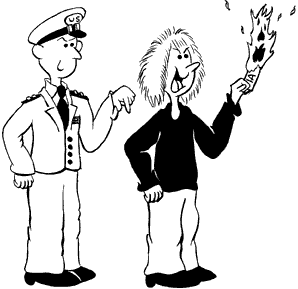
Lack of a card did not constitute exemption.
Being against the draft also meant you were against the war, and the Vietnam era became the heyday of the protest demonstration. What had been a fairly limited tool for the Civil Rights movement now became commonplace on the college campuses. Although today there is nothing so mundane and ineffectual as a protest march, at the time the demonstrators really irritated a lot of the more uptight Americans. The loud-mouthed and bribe taking Nixonian vice-president Spiro Agnew even used the Constitutional definition of treason to label the marchers. By disagreeing with him, they were, so he said, giving "aid and comfort to the enemy". And many Americans did (and still do) agree with him.
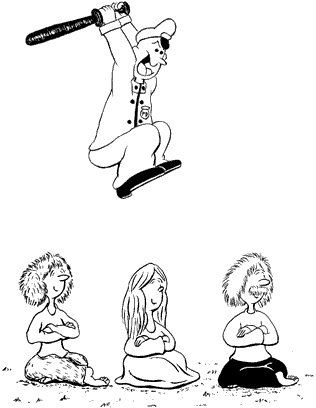
Even simple sit-ins could be quite hazardous to a hippie's health.
Today with video recorders so ubiquitous (and it must be admitted with a change in training of the police), demonstrations and protests are generally handled with general aplomb. So it's easy to forget how many of the 60's cops just loved indulging in hippie-bashing. Demonstrations were the perfect place for that, and even simple sit-ins could be quite hazardous to a hippie's health.
It was only a matter of time before something really serious happened. Finally in May 1970 at a demonstration at Kent State University, a group of National Guardsmen fired into a crowd. Four students were killed, and ten days later later, two more students were shot dead in a protest at Jackson State in Mississippi. Nearly a year later there was the massive May Day Demonstrations in Washington where over seven thousand demonstrators were arrested (only to be later released). But no further fatalities occurred in anti-war protests.
After that, demonstrations began to peter off, mostly due to the gradual withdrawal of US troops from Southeast Asia. By the Fall of 1972 a demonstration at a major university comprised maybe 20 people sitting on the quadrangle shouting "Out now! Out now!" The demonstrators decided to take something over, but they chose the Language Arts Building. That was probably the one place on campus other students would want to have shut down. In any case, an administrator came out of his office, and told the demonstrators that they were breaking the law. If they didn't leave, he said, they would be arrested. They left.
There's no doubt that the anti-war movement and demonstrations pushed the government toward the decision to pursue cease-fire negotiations. The talks dragged on until 1973, and in January a truce was declared. After a lull, the fighting resumed, but without the Americans. Finally in 1975 South Vietnam was taken over the North. By then there was no longer any draft, which had been abolished before the war ended.
The Vietnam War has often been labeled as an "unpopular" war. That is true in the sense that the man in the street didn't like 50,000 Americans getting killed. But it wasn't unpopular in the sense that most Americans were against fighting the Evil Communist Menace. After all, Nixon was re-elected with one of the largest landslides in history, largely because his opponent, George McGovern was looked upon as a patsy for the commies and wanted to end the war.
Certainly it's not true as, many hippies thought, that the average American believed that Vietnam was an immoral war. Americans, like citizens of all countries, classify morality or immorality of a war based upon whether it's won or lost.
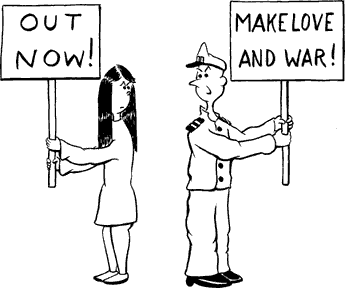
Love and War
But probably the biggest mistake is to say is that Vietnam was an example of "waging war without Congressional consent". Johnson and later Nixon not only had the Gulf of Tonkin Resolution to fall back on, but there was even a second resolution introduced later. When Nixon ordered additional mining of North Vietnam harbors and increased the bombing of Hanoi and Haiphong, the Democrats decided to rally against the war. They introduced resolution condemning Nixon's new policies. But calls, letters, and telegrams from their constituents sent the Democrats scurrying in the opposite direction. In the end Congress passed a resolution which SUPPORTED Nixon's actions. Ultimately, Nixon had gotten what he wanted. But by then he also had other things to worry about, like Watergate.
Nixon, the Hippies, and Watergate

If anyone was the personification of evil for the hippies, it was Richard Nixon
If anyone was the personification of evil for the hippies, it was Richard Nixon. Elected President by a slim margin in 1968, he would have had enough trouble even if he had been a personable and rational gentleman and had bothered to cultivate good relations with the press. Nixon, though, was one of the most personally unappealing and strangest-thinking men ever to be elected to the office. And he couldn't stand the press. After his defeat for Governor of California in 1960, he sulkingly told the assembled newsmen that they "wouldn't have Dick Nixon to kick around any more". Happily, the press found this was not true. They could to kick Dick Nixon around anytime they wanted.
The hippies hated Richard Nixon and the feeling was mutual. Partly in response to the anti-war demonstrations which Nixon felt had ruined the Johnson presidency, he became super-paranoid about getting information regarding various radical groups. Claiming the right to wiretap anyone without a court order if it was done for national security, John Mitchell, Nixon's laconic, jowly cheeked, and crooked Attorney General, undertook massive surveillance, infiltration, and disruption of the various hippie organizations.
Interpreting "national security" and "radical groups" fairly broadly, Nixon's subordinates decided they could go after any group. That meant the Democrats or anyone who disagreed with them. Nixon's flunkies really went nuts, and soon they had an official "enemies list". This included such terrible subversives as NFL quarterback Joe Namath, conductor Leonard Bernstein, and - horrors! - heart surgeon Michael Debakey.
Plans then got underway to "neutralize" their enemies. The means ranged from stupid to sinister. One aide disrupted a Democratic campaign meeting by sending in extra pizzas. On another occasion a lawyer employed by the White House decided to snare convention delegates into "intimate" situations with the administration funding the young ladies. Others tried to plant smear stories against political opponents and their families.
More serious was Nixon's willingness to approve burglary and break-ins. At one point he was given a memo now known as the "Huston Plan" that called for massive illegal activities including wire-tapping, breaking and entering, and burglary. Despite the memo itself stating that such a plan was "clearly illegal", Nixon approved it in writing. He only backed down when J. Edgar Hoover (of all people) balked. The memo was snuck out of the White House and turned over to a judge so the administration had to admit the story was true. One of Nixon's lawyers (who felt the plan was "Hitlerian") was amazed that there wasn't a call for impeachment.
Compounding the problem was Nixon's tendency to choose flunkies who were really idiots. Take Charles Colson - please.
A man whose most famous statement was that he would run over his grandmother for Richard Nixon, Chuck was definitely one of Nixon's nuttier spooks. Once he wanted one of his own lackies to steal a copy of the Pentagon Papers, the secret history of the Vietnam War (which actually didn't have any secrets) that had been leaked to the press by an employee of the RAND Corporation. Washington's famous think-tank, the Brookings Institution, had a copy, and Chuck told his flunky to start a fire and sneak in after the firemen. Exactly how anyone could start a fire in a building before he entered it wasn't clear. Chuck later said his remarks weren't serious. And Nixon's number two man, John Erlichman, even approved a plan to burglarize the office a doctor who was treating the RAND employee who leaked the report.

Chuck and His Grandma
Eventually all that nonsense caught up with them. On June 17, 1972, five men were arrested fixing a bugging device that they had planted earlier in the Democratic Campaign Headquarters in Washington's Watergate Hotel. Under questioning by the judge, one of them admitted he was a former CIA employee. He didn't admit he was the current security coordinator of the Nixon's Committee to Re-Elect the President (appropriately known as CREEP). That came out the next day in a story in the Washington Post.
"What did the President know, and when did he know it" soon became the big question. Although only one of his aides ever claimed that Nixon knew of the actual Watergate burglary beforehand, the Huston plan is pretty conclusive that Nixon loved that sort of stuff.
Given how easy it was in later years to impeach a President for the high crime of fooling around with a rather pudgy office intern, Nixon was a hard man to nab. Only after Nixon fired Archibald Cox, the special prosecutor he himself had authorized to investigate Watergate, did calls for impeachment get serious. The firing created such a firestorm that Nixon had to appoint ANOTHER prosecutor, Leon Jaworski. When Nixon wanted to fire HIM, no one would do it.
Finally the Senate committee investigating Watergate, chaired by the eyebrow twitching and Shakespeare quoting Senator Sam Ervin, learned Nixon had taped all his Oval Office conversations. Both Senator Sam and Prosecutor Cox asked for copies. Although he claimed the recordings would prove his innocence, Nixon refused to release them except as heavily edited and expletive deleted transcripts. Finally the Supreme Court unanimously ruled a President could not withhold evidence subpoenaed for a criminal case.
The shoe finally dropped. On one of the tapes recorded a week after the break-in, Nixon was heard directing the Central Intelligence Agency to have the FBI stop the investigation. Despite what was unambiguous evidence of obstruction of justice, Nixon still maintained his innocence. But when told by Congressional leaders he would face certain impeachment and conviction, he resigned.
With Nixon gone there was joy and jubilation among the hippies. Surely, a new era was dawning for American politics and conservatism was on its way out.
Fat chance.
The Radicals
Closely associated with the hippies' disdain of Richard Nixon and their views on Vietnam was their radical politics. Or at least left-wing politics, which is about as radical as you can get these days. Since today's liberalism is downright conservative by the 60's standards, to be left of the Left back then you had to go around spouting off sayings by Karl Marx, waving the Little Red Book of Chairman Mao, or sporting your "Che Viva!" t-shirt. Or all three. Since that's exactly what many hippies did, they soon began to get branded as commies, reds, and pinkos. Soon a lot of Middle America just KNEW the hippies and their ilk were just aching to tear American down and turn it over to the Russians.
Radical politics had begun at the University of California at Berkeley around 1963 as what is now called the Berkeley Free Speech Movement. It started out simply enough because there were groups of non-students putting up stands and tables on campus and hawking their ideas. But the college administration was less concerned about the non-student status than about what they thought were distinctively anti-American messages. Still the administration cited a rule that non-student groups were not allowed on campus and gave the outsiders the boot.

In later years, the Berkeley Free Speech Movement deteriorated a bit.
Well, the manure hit the fan, and soon a sizable chunk of the students had taken over part of the campus. "Part of the campus" included some buildings. Although that was, strictly speaking, illegal, eventually the students prevailed, and an area was set aside where anyone could spout off. In later years, though, the Free Speech Movement deteriorated a bit in quality. At times it was nothing more than a few people standing around with megaphone in hand chanting four letter words, just to prove they had the right to free speech.
Once radicalism hit Berkeley, though, it soon spread to other universities. As in California, the more enthusiastic of the students began taking over college buildings, which really got the dander up of mainstream America. Columbia University (home of the original Beats) was the seat of a major student takeover which ended with a lot of smashed heads. Soon the more nervous state governors were hot to send national guardsmen onto college campuses at any sign of unrest.
Oddly enough, though, some of the groups that the average Americans were most scared of, like the Black Panthers, were more interested in the results, and did not necessarily advocate violent means. After all, H. Rap Brown's slogan "If America don't come around, America ought to be burned down" did have the word "if". Early on, even the Students for a Democratic Society (the infamous SDS) had given tentative support to Lyndon Johnson with the slogan "Part of the Way with LBJ".
Although most hippies did not actively instigate violent revolution, there were groups that did. The most notorious of these was The Weatherman (later changed to the more gender neutral "Weather Underground"). The Weathermen not only broke into government buildings to steal FBI files, but also took their cue from more the violent of the anarchists of the nineteenth century. This, of course, had the opposite effect intended. When a bomb exploded in the building that housed the University of Wisconsin Mathematics Department (which did some Defense Department research), it killed a graduate student. This took the wind out of anti-war demonstrations, at least on that campus.
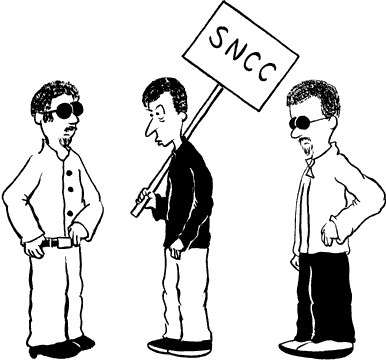
Eldridge, Stokely, and Rap: They always said "If".
But by far the most famous of the radicals were Abbie Hoffman and Jerry Rubin. Abbie and Jerry helped found the Youth International Party or YIPPIES in 1968. A yippie, they explained, was a hippie who had not dropped out. Quite the contrary. Yippies were going to take politics to the streets. And even if they couldn't change anything, they would at least have a lot of fun trying.
Abbie and Jerry were largely responsible for the radical demonstration par excellence. This was the confrontation between anti-war demonstrators and Chicago's metropolitan police at the Democratic National Convention in 1968. The actual touch-off of the riots - and a formal report on the matter concluded it was the police that rioted - was the refusal of the city to permit anyone to sleep overnight in Chicago's Grant Park. It had been three years since the beginning of the hippie era and most Americans by now looked on the hippies as subversive, disruptive, and dangerous potheads.
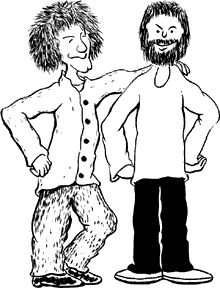
Abbie and Jerry: Different As Peas on Pot
Since there wasn't anyplace else to stay, everyone ignored the order. At 11:00 p. m. when the park officially closed, the police moved in. A good chunk of the officers removed their badges and nametags and came in with clubs swinging and mace spraying. The hoopla continued through the night and into the next day. When classes at the nearby University of Chicago were let out, the police targeted anyone who looked young enough to be a hippie. But probably the worst example of misconduct (a rather mild term for what happened) was when the police invaded the campaign headquarters of Senator Eugene McCarthy. As soon as the police burst in, they began to club the injured young people who had taken shelter there.
The Johnson administration, whose Attorney General Ramsey Clark believed in radical concepts like free speech and right of assembly, did nothing to Abbie or Jerry. But when Nixon took charge, he appointed John Mitchell as Attorney General. John had Abbie, Jerry, and six others indicted for various offenses, particularly with crossing state lines to incite a riot.
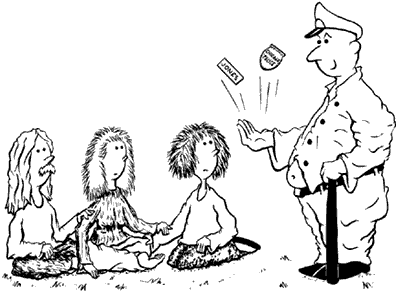
In the park, badges and name tags came off.
The highjinks in the Chicago Seven Trial (originally the Chicago Eight before Bobby Seale's trial was split off), if nothing else, made for good press. Abbie and Jerry showed up in judicial robes, and Abbie once came to court dressed as a Chicago policeman. They also goaded an already highly biased judge into such foamy mouthed and spittle-flinging rulings that all the convictions were later overturned. The judge also ended up sentencing everyone (defendants and lawyers) to multi-year terms for contempt. These sentences, too, were illegal and were later tossed out.
Abbie and Jerry never claimed they were really innocent. Abbie later said to tell the truth he didn't know if he was guilty or not. But Jerry proclaimed out loudly and proudly that he was guilty. GUILTY! GUILTY ! GUILTY !
Although Abbie wrote a number of well written and funny books, being a professional revolutionary required a lot more money than it took in. After a while, it became hard for Abbie to make ends meet. This was particularly true after he began raising a second family.
In 1974, Abbie made the mistake of selling cocaine to Federal narcotics agents, an act which sent him on the run for the next seven years. Actually, Abbie was really lucky the men were cops. The cocaine was so heavily cut that if the buyers had been real drug dealers they probably would have blown Abbie's head off.
In 1981, Abbie came out of hiding. After negotiating a plea bargain, he ended up serving three months in a maximum security prison. This was followed by eight more months in a work release program. Once out he became involved in more mainstream activism, particularly for the environmental movement. Although he was still something of a character, he began associating with people as respectable as Amy Carter, the daughter of the former President, who by the way, actually kind of liked Abbie.
But in the end, Jerry and Abbie were as different as peas on pot. In the 1980's, Jerry, capitalizing on his name recognition, forswore his radical ways. To everyone's surprise, he became a Wall Street entrepreneur and began marketing everything from megavitamins to soft drinks.
For a time he even marketed himself and went on the lecture circuit with Abbie. But by that time Abbie considered Jerry a traitor to the cause. Their shenanigans and the repartee that flew back and forth on the lecture platform may have kept their audience in stitches, but once they were off the stage, Abbie wouldn't even sit at the same bar with Jerry.
By then Abbie's politics and methods had actually become rather quaint, and he was depressed when he learned he had been listed in a crossword entry as "Ex-Rebel Hoffman". Married twice, divorced twice, he was increasingly strapped for cash. He ended up being treated for depression, and at one point his doctor recommended hospitalization. On April 12, 1989, Abbie was found dead in his apartment in New Hope, Pennsylvania. The more conspiratorial of his fans still hint about dark plots by the government, but Abbie's family and closest friends finally acknowledged it was suicide.
Jerry didn't last much longer. After working in Manhattan for a while, he moved to the West Coast. Again he worked as a venture capitalist and entrepreneur. One day he was jaywalking near his home and was struck by a car. He was hospitalized for two weeks in critical condition, but finally died on November 28, 1994.
Religion
The hippies were looked on by the more staid Americans as being pinkos, libertines, and atheists. Like any sweeping generalizations about a group you don't like, this wasn't necessarily true. While the hippies did not usually trot down to church every Sunday, many were religious. That is as long as you define religion like the American Founding Fathers did and not in terms of modern political parties which take the guise of a church.
You'd think that with their message of peace and love that the hippies would have enthusiastically taken to Christianity. After all, someone wandering around the countryside in long hair and a beard and no money sure comes off like an ideal hippie. Provided, of course, you toss out what Paul and his buddy Silas said about sex. For a while some hippies did embrace a loose non-fundamentalist Christ-As-Revolutionary Christianity, but in the end, though, the matter took care of itself.
With the abrupt and permanent collapse of the segregationist movement in the years 1964 and 1965, arch conservatives had to scramble for a new rallying cry. No longer was it permissible to vilify others, pull in the dough, and get elected by ranting about people who did not share your personal ethnicity or skin color. So why not vilify others, pull in the dough, and get elected by ranting about people who don't share your personal philosophy or private beliefs? Why indeed?
Well, in America (but not elsewhere) the infrastructure was there already as anyone knew who ever flipped on the tube on Sunday morning. So was born the political movement half-misnamed as the Religious Right, and with it the idea that Christ, by golly, just happened to share the beliefs, likes, dislikes, (particularly the dislikes), and even the voting preferences of pre-1964 conservative Americans. The whole shebang worked like a charm, not least because it also suckered in a lot of former liberals who soon got the willies about all that stuff about hellfire and damnation. In a few years, the - quote - "Religious" - unquote - Right became more successful and lucrative than the segregationist movement ever had been. But it did pretty much scotch Jesus and - quote - "Christianity" - unquote - as far as the hippies were concerned.
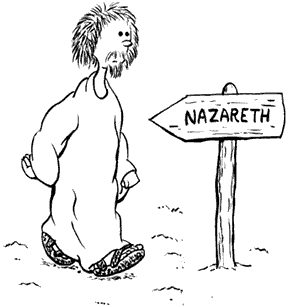
Someone wandering around the countryside in long hair and a beard and no money sure comes off like an ideal hippie
Instead of Christianity, it was the religions of the Far East that appealed more to the hippies. Having an honest-to-God (no pun intended) guru became a status symbol and burning incense became popular even for those who didn't have the misplaced belief it could disguise the smell of pot. The Hare Krishna's began to pop up on the streets preaching meditation, peace, denial of material goods, and hitting everyone up for money. Traditional Buddhism and Zen - also popular with the Beats - had some vogue, and as usual, the more credulous might go in for astrology and various forms of mysticism.
Another set of religions that appealed were those of the Native Americans. These had, in fact, been recognized by the US government as legitimate religions. Cynics, though, have pointed out that the courts' ruling that the Native American Church could continue to use peyote in it's ceremonies may have brought in more hippie converts than the teachings.

It was the religions of the Far East that had more appeal for the hippies.
If hippies didn't like any of the traditional religions, then they could always invent one. In the first days around Haight Ashbury there were two churches which had a goodly number of hippie members: the Church of the New Awakening and the Neo-American Church. If you read the doctrines now, they come off as something you'd see in a comedy club skit. But at the time, the members took them seriously. The teachings of the Neo-American Church included taking drugs (which they said were not drugs, but sacramental foods), and the ministers were called Boo-Hoos. The Church of the New Awakening also permitted use of drugs and said everyone should practice what spiritual disciplines they feel are useful.
If a hippie didn't want a bonafide religion, there were also various "philosophies" to choose from. Gandhi was always popular with his message of non-violent resistance. Also there is the story that the Great Mahatma also regularly "tested" his ability to withstand temptations of the flesh by sleeping next to naked young women. One wonders how often his spiritual strength failed him.
There was also the drop-out-of-materialistic-society teachings of Henry David Thoreau. This seemed to work best if you could find someone like Ralph Waldo Emerson to pay your bills, provide you with a Walden Pond, and bail you out of jail. Modern philosophers with a leftist bent - Jean Paul Satre and Bertrand Russell - also had some adherents. The latter's lifestyle and belief in open marriages also fit in well with the hippies' ideology.
But all in all a "do-you-own-thing" outlook goes against the teaching of almost any religion. Most hippies who turned to religion did so after they quit being hippies.
The Aging of Aquarius
The Beats are almost all dead and gone and the original hippies are passing out of middle age into their senior years. Not only have most hippies long since been transformed to into graying, portly parents, with jobs, mortgages, and stock holdings, but an increasing number now spend a good chunk of their time doting on their grandkids.
Still, some think of themselves as still carrying the banner. Recently a newspaper reviewer was writing about Ann Charters' book on the sixties. Pointing out haughtily that while Ann had only been a PROFESSOR at the time and had attended only four anti-war demonstrations, the reviewer, by golly, had actually been a member of Abbie and Jerry's YIPPIES. Not only that, he gleefully pointed out, he had been arrested twelve times. Whether being able to out-hippie Ann gave him greater credentials as a book reviewer may be questionable. But it certainly made the review easier to write since he could spend less time talking about the book.
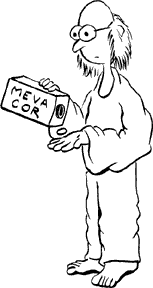
The big question remains: Did the hippies really change anything? Without doubt, they did, but not always like they wanted. Whether what they wrought is good or bad is, like every other eternal truth, a matter of opinion.
Certainly the fact that much of the American "culture" - movies, music, and fashion - focuses on youth is a direct outgrowth of the counterculture of the Sixties. Publications like The Village Voice and Rolling Stone - the latter originally a one-page local underground news sheet - are now major establishment publications read by investment bankers and stockbrokers who like to think of themselves as hip and cool. Speech is certainly freer, and four letter words are now routinely bandied back and forth on television. Even prime time cartoon characters have potty mouths.
Encyclopedias now have articles about rock stars like Janis Joplin and Chuck Berry, and rockers have been honored at the Kennedy and Lincoln Centers. In England, where you might argue it all began, there have even been knighthoods for the likes of Elton John, Paul McCartney, and even Mick Jagger. The latter dubbing no doubt left the Queen a-gagging.
The hippies' disdain for traditional styles in clothes and hair has made mainstream America more open to oddball fashions. Variant lifestyles are more tolerated (if not approved of), and deliberately outrageous movements hardly cause a flurry anymore..
On more important topics, today even the most conservative politicians at least officially support racial equality. But since both the Civil Rights and Voting Rights Acts had been passed by 1965, it can be argued that solidification of civil rights into law was pre-hippie. And both laws, it should be pointed out, were an outcome of the hippie-despised Johnson administration.
Perhaps the most important change the hippies wrought was the abolition of the draft. With 50,000 dead in Vietnam for no good purpose (and history has shown that the Vietnamese and Chinese were by no means our real enemies), the draft was ended. This has, perhaps, put at least some check on the insatiable maul of the Defense Department. Without the hippies, the draft could still be alive and well, and most young people (and a lot of older ones) think its absence is for the better.
On the other hand, a LOT of things have gone diametrically opposite to what the hippies wanted. There is certainly no guaranteed minimum wage (once a banner cry for hippies). If anything, big business has grown even more megalithic and monopolistic than ever. Universal health care - something every advanced Western country except the United States has - is as much a fantasy as it ever was, with comprehensive health programs now being the exclusive right for high level business executives, Senators, Congressmen, and American Presidents.
The Vietnam War did not make the United States adopt any less militaristic philosophy. A lot of the hippies, though, never realized this. One of the original radicals once boasted how "they" had made it where you could no longer commit 50,000 troops to fight a war that hadn't been declared. Actually just the opposite happened. Yes, Congress did finally pass the War Powers Act (over Nixon's veto). But far from preventing the President from sending the army in, it ALLOWS the President to commit troops without Congressional consent. Although there is a theoretical time limit, in practice the Presidents have been able to do so pretty much as they please.
But for half a century the one thing that certainly did not come to pass was the "decriminalization" of drugs. For a short while it was almost a given that "recreational drugs" would be eventually legalized with restrictions similar to alcohol. This was particularly the thinking regarding marijuana. In the early 1970's, one of the country's most conservative district attorneys (who actually prevented the hippie musical "Hair" from being presented in its entirety) publicly lamented that he believed pot would eventually be legalized. Then, he predicted, you would "see an awful lot of sick people wandering around."
He needn't have worried and he went to his reward in blissful contentment as the country shifted to a hysterical zero tolerance mentality. America's policy even influenced international treaties as the anti-drug crusade was taken to all nooks and crannies of the world. America's politicians breathed a sigh of relief that the world was becoming safe from the likes of the hippies.
But then after the first decade of the millennium, some of the United States - realizing that incarcerating 1 % of the total population and about half for simple possession - was making absolutely no sense - began thumbing their noses at the Federal Government and not only passed laws permitting use of marijuana but said they would not provide any assistance to the national agencies in enforcement of the federal laws. Naturally some of the foreign leaders went into spittle flinging diatribes as to why the US would put pressure on foreign countries to enforce a policy they themselves were now ignoring for their own states. There is no real answer, of course, except perhaps that's what the hippies would have wanted.
But probably the biggest surprise to the hippies was how by the mid-1970's, the label "liberal" had become the kiss of death for any politician. Both Democratic Presidents elected in the years following 1968 - whether Carter, Clinton, or Obama - have been quite conservative by the hippie standards, and the days of a Eugene McCarthy or a George McGovern making it in mainstream politics are dead and gone. Actually it's pretty funny to see how politicians now try to disavow any hint of liberality. Soon newspapers labeled Supreme Court Chief Justice William Rehnquist as one of the Court's "moderates", and so it's no surprise that books like "The History of Liberalism" began appearing on the bookshelves.
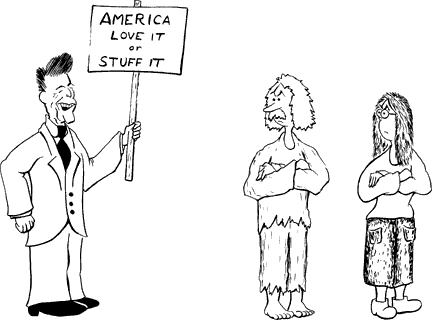
The Demise of the Hippies
The hippie era did not so much end as peter out. But if a date is needed that signaled the ultimate and final demise of the hippie movement, it had to be the 1980 election of Ronald Regan, a man who even more than Richard Nixon was truly the anathema to the hippies. A year later a former hippie (who by then had a Ph. D. from Johns Hopkins and was working in corporate America) said, "If you had told me six years ago that Ronald Reagan would have been elected President, I would have cut my throat!" Little did he know. Reagan was not only the first president since Eisenhower to serve two full terms, but he would end up being one of the most popular presidents in the history of America.
One wonders how much all this had to do with the sad fate of Abbie Hoffman. His books are still around. But if you look in the used-book catalogs you'll find "Steal This Book" - originally so controversial that some stores wouldn't even carry it - listed as "nostalgic", "dated", and "a little sad".
Abbie Hoffman?
A Little Sad?
Nostalgic?
Dated?
ABBIE HOFFMAN????!!!!!!!!??????
He probably just couldn't stand it.

Bibliography
Beneath the Diamond Sky: Haight Ashbury 1965-1970, Barney Hoskyns, (Simon and Schuster, 1997). A "definitive" history of the hippies in San Francisco and how they were gone almost as soon as they arrived. That is, it would have been a good description if it you could read it without going blind. The publishers obviously tried to make the book reminiscent of the times and used what we must assume was supposed to be psychedelic paper. Actually it looks more like the first web page designed by every beginning computer class. Someone should tell Simon and Schuster that you can't read black text on red, green, blue, and yellow blended backgrounds.
The Hippie Dictionary, John Bassett McCleary, (Ten Speed Press, 2002). A very good and comprehensive source of who was who, what was what, and when was when. A bit effected with hindsight and revisionism, though. After all, was "interface" really a hippie term meaning to interact with others? The term seems to be more 1980's once the graphical user interfaces became ubiquitous.
Also the entry on "chick" seems a bit too apologetic. Very few considered the term offensive until the 80's rolled in with its hyper-active political correctness. Lastly the author seems just a tad bitter that the revolution didn't seem to come off as planned.
The Hippy's Handbook, Ruth Bronsteen, (Canyon Book Publishers, 1967). A small but informative and objective look about the hippies written in their heyday and so without any hindsight revisionism. Because of its contemporary nature, immediacy, and non-negative stand, this book is a particularly valuable reference despite its small size. In particular, the book shows you that what are now considered major and essential facets of the modern hippie movement were relatively minor concerns in the 1960's. For instance see Doc Edwards comments on eating steak. The trouble is this books went through only one edition and is fairly hard to find. This book is a good candidate for an online reprint - but let CooperToons hasten to say - only if done so legally and with proper permission. After all, true hippies respect intellectual property rights.
The Hippies, Burton H. Wolfe (Signet, 1968). Another contemporary look at the hippies with a distinctly more negative tone. It seems the author was not only a bit straight-laced, but also caught the hippie scene in San Francisco as it began to fall apart.
Run Run Run: The Lives of Abbie Hoffman, Jack Hoffman and Daniel Simon (NY: J.P. Tarcher/Putnam's Sons, 1994). Jack was Abbie's younger brother and so writes knowledgeably about his family life and had inside information once Abbie went on the lam. The trouble with Abbie was you never really could take him seriously and so he was a lot less effective than he could have been. You wonder if in the end Abbie hadn't wasted his undoubted gifts. All in all a sad story.
Steal This Dream: Abbie Hoffman and the Counterculture Revolution in America, Larry Slomanm, (Doubleday, 1998) An "oral" history of Abbie by his friends, former friends, enemies, and former enemies. As in all oral histories what you get is a collection of quotes which means you can't really tell how accurate the book really is.
Whatever Happened to Timothy Leary?, John Bryan (San Francisco Renaissance Books, 1980). The definitive but unauthorized biography and a great book about Tim's life through the sixties and seventies. You also get a good feeling of the hippie days and come away understanding why most everyone who met Tim liked him.
One of the best parts of the book is about Tim's early work at Harvard. Although the author is sympathetic to Tim, it's hard to be too critical of the Harvard administration. You wonder if Tim really had applied scientific standards to his research that maybe he could have really done something. Who knows? Maybe the world wouldn't be in the current schizophrenic state of paying billions to pharmeceutical companies and also spending billions more fighting the "War on Drugs". Tim's unthinking and almost religious advocacy of drugs probably contributed to this sad state of affairs as much as anyone.
Jail Notes, Timothy Leary (Douglas, 1970). Tim's own and rather incoherent account of his time in jail. The title does say "notes" and that's what it appears to be - unconnected sentence fragments without the benefit of an editor. But more likely it was Tim trying to produce an innovative and immediate "prose" style. The introduction by Allen Ginsberg isn't much better. Not much use, really.
Aquarius Revisited, Peter O. Whtimer with Bruce Van Wyngarden (MacMillan Publishing, 1987) A book of interviews with Hunter S. Thompson, Timothy Leary, Allen Ginsberg, William Burroughs, Ken Kesey, Norman Mailer, and Tom Robbins. It also has a great first hand description of the beginning of the hippie days at Berkeley.
A lot of the book is actually the author telling you how much trouble it was to get the interviews. This makes the book fatter, and it must be admitted, a bit more interesting. Allen Ginsberg definitely comes off as a man who lived in his own world. He appears impulsive, short tempered, and a bit nuts. NOT the Allen found in the definitive biography by Allen's friend, Barry Miles.
Ginsberg: A Biography, Barry Miles, Simon and Schuster, 2000). Allen comes off as much more relaxed than in the book by Peter Whitimer. The first edition was published while Allen was still alive but the revised edition covers his whole life. Given Allen's relative longevity, the hippie days are only a part of the book. But it's a big book. A very good chapter about the Democratic Convention of 1968.
How Can I Keep From Singing?, Dave Dunaway. (Da Capo Press, 1990). A good biography of Pete Seeger and so it covers the history of the Folk Music Revival although not hippies per se. Pete is the best folksinger we've had and probably is the one person left in America who believes in the true American ideals.
Woody Guthrie: A Life, Joe Klein. (Alfred A. Knopf, 1980). Again a lot about the history of the Folk Revival. Some people were surprised when they read that the composer of "This Land Is Your Land" was an avowed Communist. Woody ended up hospitalized for Huntington's disease long before the hippie era began, but his influence on the folk-music crowd was great.
The Final Days, Bob Woodward and Carl Bernstein (Simon and Schuster, 1976). Although the book is about the end of the Nixon Presidency, there's enough background to learn about Nixon's attitude toward the hippies and anti-war demonstrators. Originally a lot of people doubted some of the stranger stories, such as the part where a near hysterical Nixon drops down on the floor and begs Henry Kissinger to pray with him. But when everyone else started to cash in and write books about knowing Dick, just about everything was confirmed. Also see the same authors' All the President's Men for what it was like in the Nixon era before the final days.
Electronic Sources
Although Internet references are often tenuous, unreliable, and short-lived, the following are useful, well researched, and apparently a bit longer term than some:
Hippy.com A web site about and by the practitioners of the modern hippie movement (despite some misconceptions, CooperToons remains open to the discussion of defining a new vs. old hippie). This would also be a good forum for serious, well-documented historical writing about the movement.
The Diggers Archive at http://www.diggers.org has a history of the Diggers with some contemporary articles. You can also find some photos and articles about Emmett Grogan on the web.
At one time you could access a nice website about the 60's at http://www.lib.virginia.edu/speccol/exhibits/sixties/ and a site about Woodstock at http://www.woodstock69.com/ but it seems to have vanished from cyberspace.
There was a fair amount of interesting primary material including Santana's contract. By today's standards it seems awfully low pay, but $1 in 1969 was about than $7 in today's currency. Corrected for inflation, then, the pay doesn't seem so chintzy.
Timothy Leary set up his own website in 1992 at http://www.leary.com but for a long time it was "closed for renovation". If you click it now you get a video of Tim working at his desk but as far as CooperToons can tell, nothing else. Tim's life, like Abbie Hoffman's, comes off as rather sad. You can't really feel too sorry for Tim, though. Somehow he always managed to get by, and he outwardly seemed to be such a happy man. Not many people can say that.